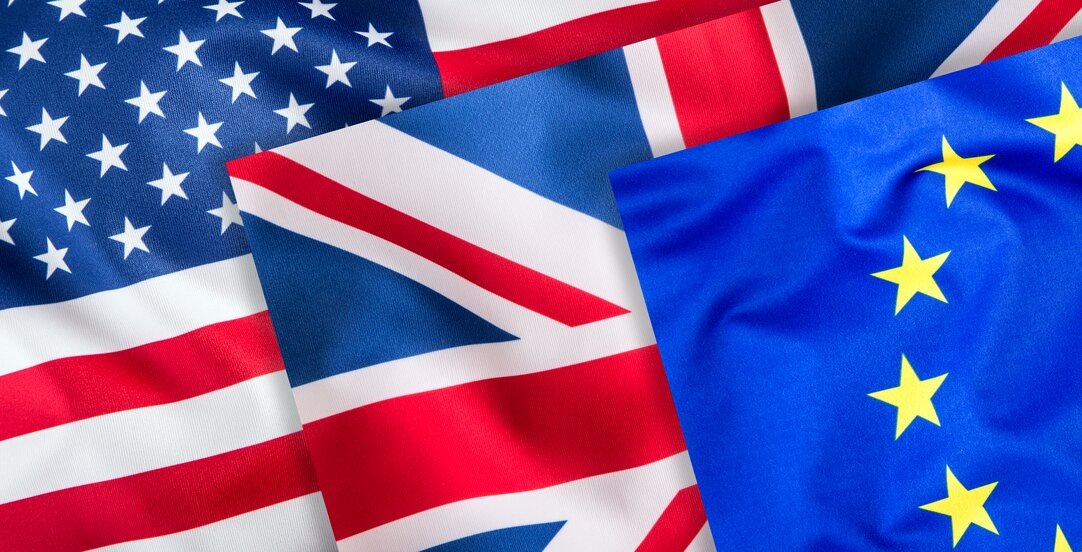Increasing EU, UK and US sanctions against Russia

Following Russia's continued military aggression towards Ukraine, the EU, UK and US have adopted new sanctions against Russia since our last WR Sanctions Alert on 25 February 2022. We have summarised the main developments below.
Lesetid 6 minutter
EU sanctions
On 26 February, the package of EU sanctions that were announced after Russia's military invasion of Ukraine came into force. As expected, the sanctions package broadly includes (i) expanded and new financial sanctions; (ii) export restrictions relating to the aviation sector and oil refineries; (iii) export controls related to high technology and dual-use goods; and (iv) individual sanctions directed against additional persons. (The Official Journal of the EU, in which all legal acts are published, is available here, and press release is available here.)
The export related restrictions are broadly:
- Prohibition on the direct or indirect sale or export of specific goods and technology suited for oil refining (as listed in Annex X to Council Regulation (EU) 2022/328) to or for use in Russia, including technical or financial assistance of the same
- Prohibition on the direct or indirect sale or export of specific goods and technology suited for use in aviation or space industry (as listed in Annex XI of Council Regulation (EU) 2022/328) to or for use in Russia, including technical or financial assistance of the same, as well as related insurance or reinsurance
- Prohibition to sell, supply, transfer or export, directly or indirectly, certain goods and technology which might contribute to Russia's military and technological enhancement or the development of the defence and security sector (as listed in Annex VII of Council Regulation (EU) 2022/328) to or for use in Russia, including technical or financial assistance of the same
- Prohibition to sell, supply, transfer or export, directly or indirectly, dual-use goods and technology to or for use in Russia, including technical assistance or financial assistance for the same
- Note that there are certain exceptions and possibilities for authorisations available
The financial sanctions part of the package comprise of:
- A prohibition on public financing or financial assistance for trade with, or investment in, Russia
- A prohibition to directly or indirectly purchase, sell, provide investment services for or assistance in the issuance of, or otherwise deal with transferable securities and money-market instruments, as well as new loans or credit exceeding a further specified maturity date or for persons referred to in the regulation
- A prohibition to accept any deposits from Russian nationals or natural persons residing in Russia, entities established in Russia, if the total value of deposits of the natural or legal person per credit institution exceeds 100 000 EUR (with an exception of non-prohibited cross-border trade in goods and services between the EU and Russia)
- A prohibition for Union central securities depositories to provide certain services for transferable securities issued after 12 April 2022 to any Russian national or natural person residing in Russia or any legal person established in Russia
- A prohibition to sell euro denominated transferable securities issued after 12 April 2022 or units in collective investment undertakings providing exposure to such securities, to any Russian national or natural person residing in Russia or legal person established in Russia
- A reporting obligation for credit institutions on list of deposits exceeding EUR 100 000 held by Russian nationals or natural persons residing in Russia or by legal persons, entities or bodies established in Russia
- A prohibition on satisfying claims affected by the measures imposed under the Regulation
Adding to these financial sector sanctions, on 28 February, the EU adopted a prohibition from making any transaction with the Russian Central Bank, or any legal person, entity or body acting on behalf or at the direction of the Central Bank (press release available here).
Notably, the EU has significantly broadened its authority to designate individuals and persons on its sanctions lists, to include inter alia parties that are supporting or benefitting from the Russian Government, and "leading businesspersons or entities involved in economic sectors providing a substantial source of revenue" to the Russian Government. Over the past days, the EU has designated personalities such as President Putin and Foreign Minister Lavrov, as well as oligarchs and businessmen active in the oil, banking and finance sectors (i.a. the CEO of Rosneft and the CEO Transneft), government members and high level military personalities. Information concerning designations made on 25 and 28 February is available here, here and here.
Moreover, the EU has closed its airspace to Russia and effectively imposed a ban on Russian aviation in the EU.
Norway has reiterated that it will align its sanctions regime with all EU sanctions targeting Russia, but has currently not specified when or how quickly the Norwegian measures will be implemented.
UK sanctions
The UK has banned all Russian commercial and private jets from UK airspace. Further, the UK also recently banned all Russian flagged, registered, owned, controlled, chartered or operated vessels from docking at its ports.
On 1 March 2022, the UK adopted a new sanctions package against Russia, by amending its Russia (Sanctions) (EU Exit) Regulations 2019. The new sanctions include inter alia:
- Prohibitions from undertaking financial transactions involving the Russian Central Bank, the Russian National Wealth Fund and the Ministry of Finance of the Russian Federation
- Prohibitions from dealings with transferable securities and money market instruments issued on or after 1 March 2022 by certain parties, namely:
- an entity incorporated or constituted under UK law and owned by inter alia Sberbank, VTB Bank, Gazprombank, or an entity acting on behalf of or at the direction of such bank, where the security or instrument has a maturity exceeding 30 days;
- a "person connected with Russia" or entity owned or acting for, or behalf of or at the direction of, this person; or
- the Government of Russia.
- Extensions on the scope of existing prohibitions on issuing loans or credit to include loans or credit made or granted to certain listed entities (including inter alia Sberbank, VTB Bank and Gazprombank); an entity "connected with Russia" (or owned or acting on behalf such a person); or the Government of Russia.
- Prohibition on UK credit or financial institutions from establishing or continuing a correspondent banking relationship, and from processing sterling payments to, from or via a designated person or a credit or financial institution owned or controlled by them.
In addition, the UK has adopted more stringent export controls. Inter alia, the UK has implemented a ban on the export, supply and delivery, making available and transfer of certain "critical-industry" goods and technology (as well as related technical assistance, financial services, funds and brokering services) to, or for use in, Russia; and, effectively, a ban on the export of dual-use exports.
The UK has designated several individuals and entities on its sanctions list, including inter alia three Russian financial institutions (VEB.RF, Bank Otkritie and SovComBank, notice available here), and Russia's sovereign wealth fund, the Russian Direct Investment Fund (RDIF), and its CEO Kirill Alexandrovich Dmitriev (notice).
The UK Foreign Secretary stated yesterday (28 February) that more legislation will follow in coming weeks, inter alia to limit Russian deposits in UK banks (statement available here).
US sanctions
On 28 February, the US imposed additional financial sanctions on Russia, freezing the assets of Central Bank of Russia, the National Wealth Fund of Russia and the Ministry of Finance of Russia, see the new Directive 4 under Executive Order 14024. Until 24 June 2022, however, all transactions "that are related to energy" with certain entities, including inter alia Sberbank, VTB Bank and the Central Bank of Russia, are authorized, cf. General Licence 8A.
During the past days, the US has also added several individuals and entities on the SDN List, including inter alia President Putin and Foreign Minister Lavrov on 25 February (OFAC notice available here) and, on 28 February, one of Russia’s key sovereign wealth funds, the Russian Direct Investment Fund (RDIF) (OFAC notice available here).
SWIFT
Prior to many of the above developments, on 26 February, the EU, UK and US, France, Germany and other countries announced inter alia their joint commitment to ensure that selected Russian banks are removed from the international SWIFT messaging system (joint statement available here). The parties stated that the SWIFT related restrictions would be implemented "within the coming days", but have not yet been published. The commitment to exclude certain Russian banks from SWIFT has subsequently been reiterated by the EU (here and here), the UK (here), and, today (1 March), also by Norway (here).
WR Sanctions Alerts provide you with updates on material developments in the country-specific sanctions programmes implemented by the US, the UN, the UK, the EU and Norway. We will not provide updates on mere prolongations, without material changes, of existing sanctions programmes, nor on any listings or de-listings of individuals/entities placed on implemented sanctions lists . Please note that the WR Sanctions Alerts are provided as general information and do not constitute legal advice.
